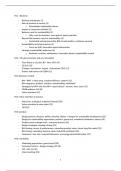HC1 : Business
- Business entreprises (1)
- Role of business in society (2)
o Shareholder/stakeholder theory
- Impact of corporate activities (2)
- Business case for sustainability (3)
o Why, wins for business, case against, javons paradox
- Beyond the business case for sustainability (4)
o Sustainable entrepreneurship, BM transformation, continues renewal
- Sustainability oriented practices (5)
o Focus on SME, Innovation types &interaction
- Strategic sustainability behaviour (6)
o Resistant, reactive, anticipatory, innovation based, sustainability rooted
HC2 : Circular economie and eco innovation
- From linear to circular (8) + intro 10 Rs (9)
- CE & EI (10)
- EI target, mechanism, impact + interaction CE EI (11)
- Drivers and barriers of CEBM (12)
HC3: Business models
- BM + BMC + value prop, creation/delivery, capture (13)
- BM categories: product, solution, matchmaking, multisided
- Strategies for BM: why new BM + open/closed + narrow, slow, close (15)
- CEMB patterns (16-18)
- Value retention (19)
HC4: Value retention in process
- Value loss: ecological, material, financial (20)
- Value retention in value chain (21)
- 10 R(22)
HC5: product
- Design process: discover, define, develop, deliver + designs for sustainable development (23)
- Design for sustainability approaches: product: green/eco, emotional, behaviour, nature (24)
- Product service design level + outcome/process (24)
- Design strategies: slowing/closing (25)
- BM slowing: access & performance, extending product value, classic long life model (25)
- BM closing: extending resource value, industrial symbioses (26)
- Consumer/ user role: required behaviour, encourage desired behaviour (27)
HC6: marketing
- Marketing approaches: green/social (28)
- Consumer factors + design strategy (29-30)
- STP + 4Ps (31-32)
- Green washing (33)
1
,HC1
Business entrprise =
• a profit-seeking organization
• that provides goods and/or services designed to satisfy customers’ needs
• by transforming lowervalue inputs into highervalue outputs (adding value)
2
,Role of business in society (who should benefit)
Shareholder theory: Best interest for shareholders (by profit)
Stakeholder theory : needs of other stakeholders involved
Impact corporate activities
- On society & environment (-/+ sustainable development)
3
, Business case for sustainability
= how a company can actively create synergies between managing environmental or social issues in a
way that increases corporate economic performance
Why?
- Pollution accidents reputation
- There is a market
Wins for business
- Cost reduction
- Risk management
- Sales and profit margin: sustainable= higher price
- Reputation
- Attractive for new employees
- Fostering innovation
BUT!!!
- Has not led to radical change in unsustainable business practices
- Has not solves major environmental problems
BECAUSE… (case against)
- Optimalisation over environment
o Direct: waste reduction + energy efficiency
o Indirect: certificate over really doing something
- Technological optimism instead of holism in environmental issue solving
- Consumerism over degrowth
o Market in sustainable is growing, but unsustainable not shrinking
Javons paradox =
o (many innovations consuming more)
o (new innovation other damages)
o (innovations for more harm efficiently cutting forrest)
4





